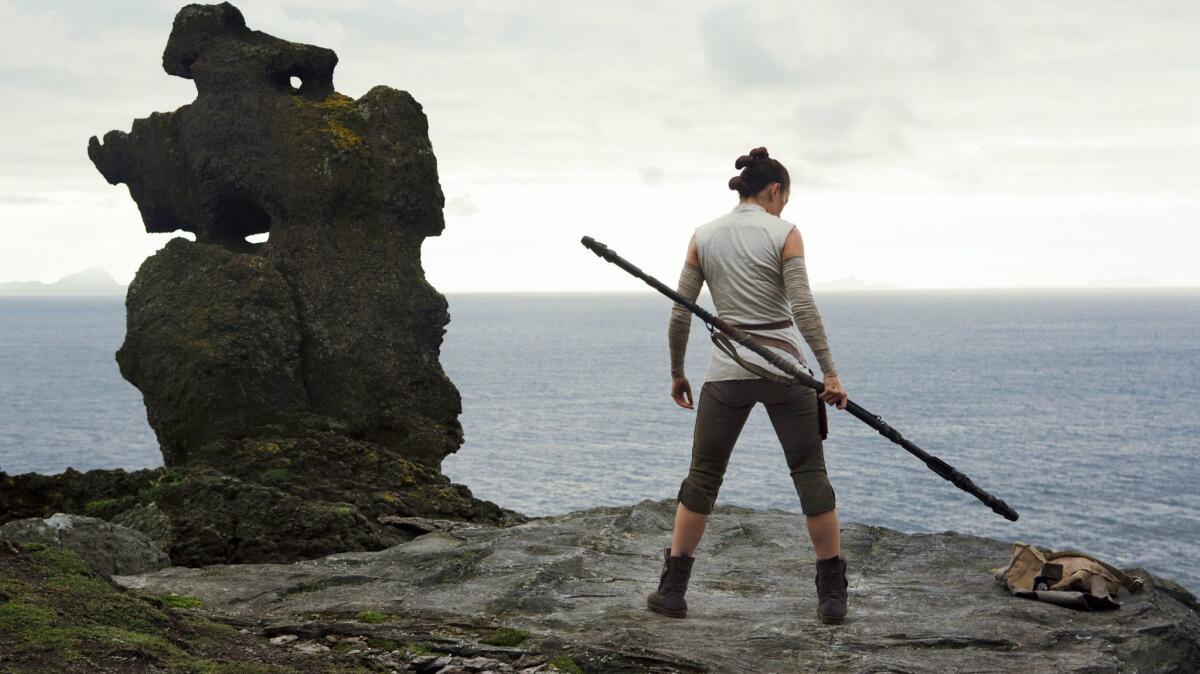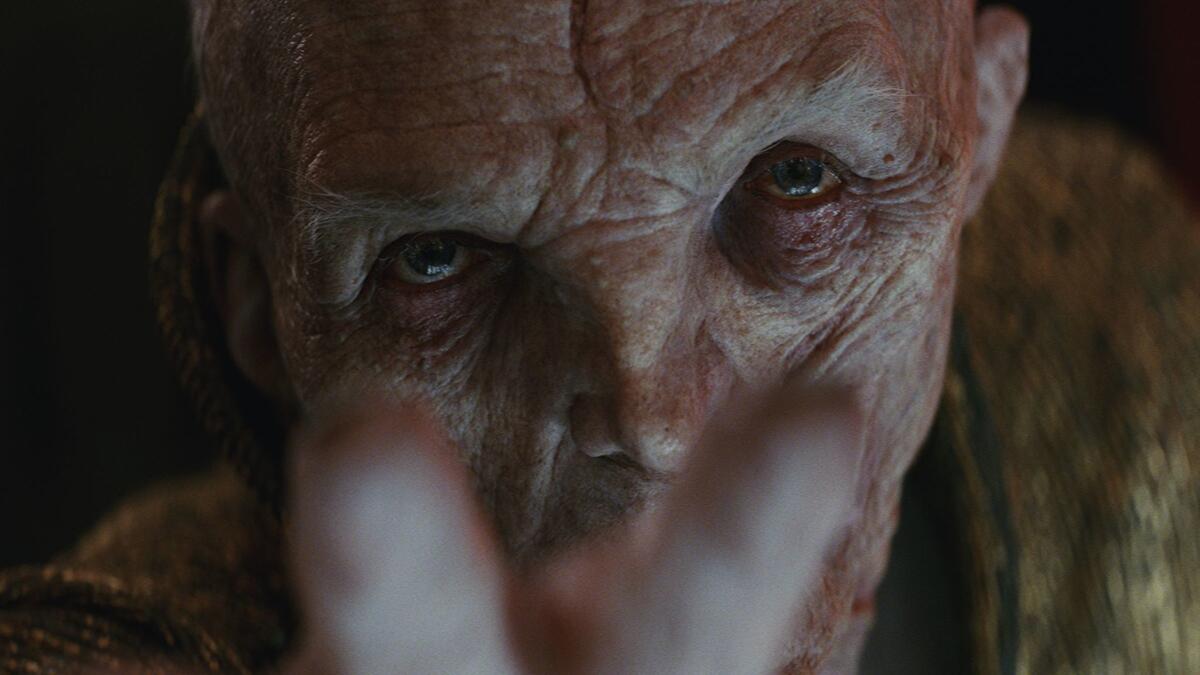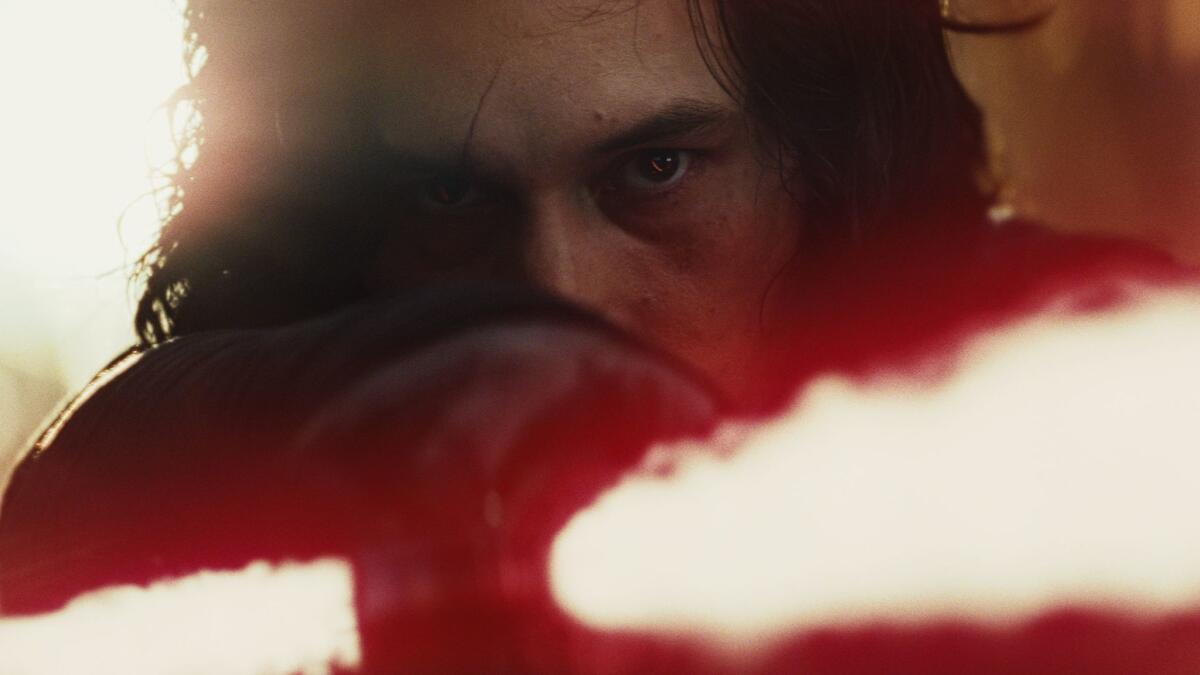Q&A: Rian Johnson on the evolution of the Force in ‘Star Wars: The Last Jedi’ and more spoilers
As Obi-Wan Kenobi once told young Luke Skywalker, “The Force is what gives a Jedi his power. It’s an energy field created by all living things — it surrounds us, and penetrates us; it binds the galaxy together.”
Ever since Tatooine’s favorite farm boy learned about the Force, “Star Wars” fans have devoured every bit of the universe that’s come alive in the galaxy far, far away over the course of eight movies and counting.
But in Disney’s weekend box-office smash “Star Wars: The Last Jedi,” writer-director Rian Johnson (“Brick,” “Looper”) takes bold leaps and shakes up the “Star Wars” universe, sending “Force Awakens” heroes Rey (Daisy Ridley), Finn (John Boyega), and Poe Dameron (Oscar Isaac) further into the fight between light and dark with one surprise after another.
How much does “The Last Jedi” redefine the rules of Force physics as we know it — and what do these tantalizing new possibilities mean for the future of “Star Wars?” Who is Snoke, anyway? What exactly can Force ghosts do from beyond the astral plane? Has Kylo Ren ever kissed a girl?
Back in Los Angeles between globe-trotting appearances, a week after his star-studded premiere, Johnson answered all these burning “Star Wars” questions and more. Heavy spoiler warning: Best to read after watching “Star Wars: The Last Jedi.”
“The Last Jedi” takes much of what we all thought we knew about this 40-year-old franchise and how the rules of the Force work, and expands them in some wild new ways. Knowing the doors you were going to open, what were your consultations like with Lucasfilm’s in-house protectors of the canon while writing the script?
There is a man named Pablo Hidalgo who is the sweetest dude in the universe, and he’s one of several keepers of the flame at Lucasfilm. It would always be a conversation, and if the story required it and if it felt like it stretches into new territory but doesn’t break the idea of what the Force can do, Pablo was down — I got the blessing.

The evolution of Rey’s relationship with Kylo Ren takes an intense and pivotal turn in “The Last Jedi.” We learn that Supreme Leader Snoke has linked them through the Force, as if he were connecting a call at a switchboard — an idea thematically mirrored in Poe’s “bad connection” scene with Hux earlier in the film. Where did that idea originate?
It was always through the demands of the story. With the Force connections between Rey and Kylo I thought, “OK, I need to get these two talking. But if I put them face to face they’re going to either fight, or one of them has to be tied up” —
Well, they could also make out …
They could also make out! I’m going to give you a spinoff movie …
Even if they make out, then they can’t be talking. So I knew I wanted them to talk, and to talk enough to where we could go from “I hate you,” to her being forced to actually engage with him. That’s where the idea of these “Force connections” came from, which is kind of a new thing. It’s a little bit of a riff on what happens with Vader and Luke at the end of “The Empire Strikes Back,” but it’s entirely new in some regards.
I’ve got a catchy name for Rey and Kylo’s sexy “Force connection” sessions for you: “ForceTime.”
[Laughs] I’ve heard “Force Skyping,” but that’s good! I’ve got to talk to Apple. There’s a real big co-branding opportunity here.
Review: 'The Last Jedi' brings emotion, exhilaration and surprise back to the 'Star Wars' saga »
Some of these revelatory new Force possibilities might be challenging for fans to accept. Are they such a stretch within “Star Wars” science and the greater franchise?
The truth is, because “Star Wars” until “The Force Awakens” has been set in amber and we hadn’t had a new “Star Wars” movie in 10 years, you forget that they were introducing new Force stuff with each movie, based on the requirements of the story. Force-grabbing didn’t come around until “Empire,” it wasn’t in “A New Hope.” Same with Force ghosts. They’d introduce new ideas of what could happen with the Force each time.
After the climactic battle on the salt planet Crait we learn Luke was projecting himself from his island the whole time. How does that scene rewrite the rules of the Force? Could a Force user projecting themselves physically influence the world around them, not just the minds of others?
That’s a question. When Luke shows up he’s projecting, it’s like a hardcore variation of what Kylo and Rey have been doing the whole time and that’s why it takes so much out of him. In the version that we play, no. We tried to play really, really fair. In terms of his footsteps – we removed all of his foley — there are no footstep sounds. They never touch. And if you look, the salt flakes that are falling are sparking off of Kylo’s saber and not off of Luke’s.
What about Force ghosts and the suggestion that Jedi masters wield even more previously unknown powers from beyond the grave? Can powerful Force users create physical, tangible manifestations?
The one point where we do introduce a bit of a twist in terms of Force ghosts is where Yoda calls down the lightning onto the tree. That, I think, is a tantalizing hint of the potential of someone who is a Force ghost interacting with the real world.

Hypothetically speaking, can dark Force users become Force ghosts?
I think that would be interesting. We haven’t seen them in the movies as far as I can remember. But that would be really interesting considering the dark side is about self-preservation, trying to find immortality, and the notion that the light side actually got to it through selflessness — what would the dark side version of that look like? There’s so much cool [stuff] to think about if you’re willing to open your head a little bit!
Another surprise in this film is seeing Leia use her latent Force powers after decades of being the Skywalker twin who doesn’t wield the Force. Why was that an important parting gift to give both Leia and Carrie Fisher?
That was something Kathy [Kennedy] was always asking: Why has this never manifested in Leia? She obviously made a choice, because in “Return of the Jedi” Luke tells her, “You have that power too.” I liked the idea that it’s not Luke concentrating, reaching for the lightsaber; it’s an instinctual survival thing, like when you hear stories of a parent whose toddler is caught under a car and they get superhuman strength, or a drowning person clawing their way to the surface. It’s basically just her not being done with the fight yet.
I wanted it to happen [for Carrie] and I knew it was going to be a stretch. It’s a big moment, and I’m sure it will land different ways for different people, but for me it felt like a really emotionally satisfying thing to see.
Han’s dice are a nice touch that resonates with Luke, Leia and Kylo, not to mention the fans, and a callback to how he got the Millennium Falcon in the first place.
When I wrote it, it was something that was in “The Force Awakens.” I think they shot it and didn’t end up using it: When Han comes onto the Falcon, he takes his dice out of his pocket and hangs them back up, like, “This is mine again.” When it got pulled out [of “The Force Awakens”] I thought, even if it’s not directly set up I think you’ll get it that these are Han’s dice. The notion that they get used different ways ending with Kylo, I liked.
How Rian Johnson made heroism inclusive in 'Star Wars: The Last Jedi' »
Fans have been obsessed with Snoke’s origins since “The Force Awakens,” and while we get to know him much more in “The Last Jedi,” you don’t necessarily give that answer. Does it matter who he was?
Not in this story it doesn’t, which is not to say it wouldn’t be interesting — they might explore it in the next movie or elsewhere. I wrote this script before “The Force Awakens” came out, so when I wrote it, the “Who is Snoke?” mania hadn’t arisen with the fans yet. Even if it had, my perspective is it’s similar to how the Emperor was handled. The first three movies you know nothing about the Emperor because you don’t have to, because that’s not the story. You know exactly what you need to know. Whereas in the prequels, you know everything about him because that is the story.
In this movie, Rey doesn’t really care where he comes from, so if in any of their scenes he had stopped and done a 30-second monologue about how he is [Darth] Plagueis or whoever, Rey would have blinked and looked confused and the scene would have gone on … and we would have ended up cutting it in the editing room because it doesn’t matter to the story right now.
Why does it matter, then, who Rey’s parents are — the idea that she doesn’t come from a lineage of “special” Jedi kin?
It felt like the way to go because it’s the hardest thing that she could possibly hear. It would be the easy thing for her to be defined by, “yes, this is how you fit into this story — it’s because your parent is so and so!” In that moment, for Kylo to be able to use that [information] as a knife and twist it to try and get what he wants, felt like the most dramatically potent option.

Please explain the dramatic necessity of giving Kylo Ren a shirtless scene.
At the premiere I heard somebody in the balcony say, “Yesssss!” You can see Adam was training hardcore throughout the whole process. It’s fun but it also has a specific purpose, which is the increasing feeling of uncomfortable intimacy. That was sticking with the theme of trying to give Rey the hardest thing you could possibly give her, which would be unavoidable intimate conversation with this person that she wants to just hate. This was just one more way of upping that ante.
So … is this the first time Kylo has ever held hands with a girl?
I actually talked about that with Adam [Driver]. Adam was like, “So … have I actually kissed a girl before?” I would think maybe he has. Maybe after hours in the Jedi camp, there was a game of spin the bottle — “spin the lightsaber…”
Only good movies
Get the Indie Focus newsletter, Mark Olsen's weekly guide to the world of cinema.
You may occasionally receive promotional content from the Los Angeles Times.








